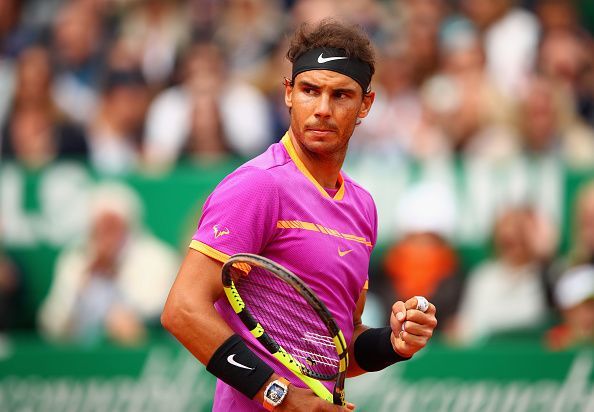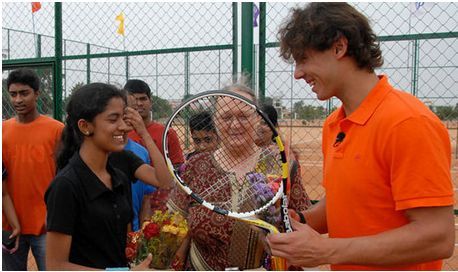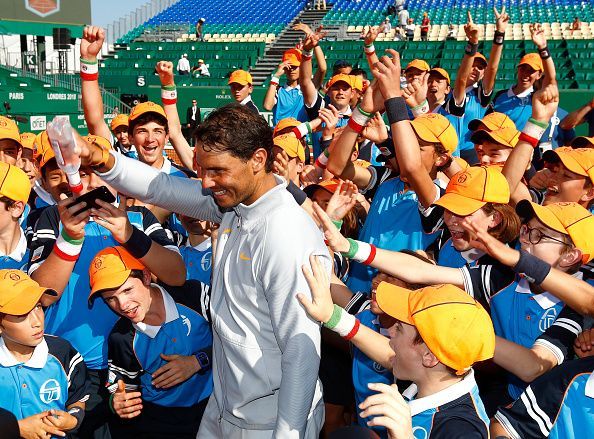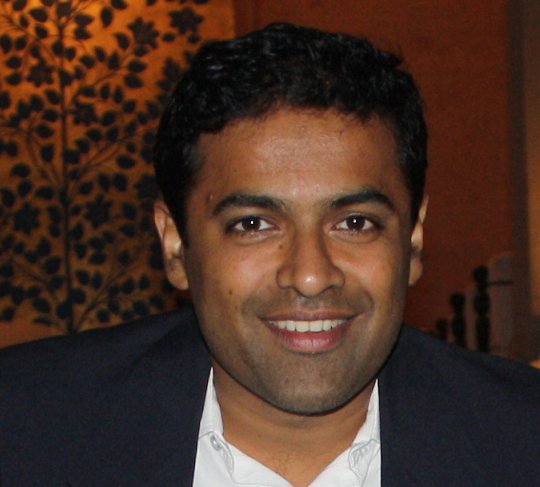The chants of ‘Vamos Rafa’ in Anantapur district

Any individual or organization that attempts to achieve social integration in a country like India knows how complicated things can get. It is the same as peeling back the skin of an onion; there are almost too many layers to it.
Can tennis, a sport designed by the elite for the elite, reach the poorest in the society and be a vehicle for change?
The Rafael Nadal Foundation
The world knows Rafael Nadal for his exploits as a legendary tennis player. Until 2010, that world did not include Anantapur district of Andhra Pradesh.
The children studying in Government schools in Anantapur had to deal with a different sport called Life. And then, something started to change. The game of tennis was introduced to them by the Rafael Nadal Foundation.
Yes, striking a tennis ball was undoubtedly one of the main objectives of the foundation, but transforming the lives of the children was the grand plan set out by Nadal.

Rafa and his mother Ana María Parera created the Rafa Nadal Foundation in 2008 (the same year Nadal defeated Roger Federer to win his first Wimbledon title), to empower the lives of children who run the risk of exclusion in society. The Foundation strongly believes that sport and education are integral to the positive development of a growing child.
A project named the Nadal Educational and Tennis School (NETS), launched in 2010, has been carried out in collaboration with Anantapur Sports Academy (ASA) and Fundacion Vicente Ferrer.
Nadal Educational and Tennis School
An individual sport like tennis needs personal attention. Unlike other academies that focus on tennis skills alone, the Nadal Education and Tennis School (NETS) mandates the learning modules of English and Computers three times a week to develop the players holistically. The children receive everything that is required to play tennis – transport, nutrition, apparel, tennis racquet and shoes. That frees them to focus on their education and get the best out of their talent.

The NETS impacts more than 200 children every year. In the initial years, technical coaching staff from Spain was stationed at Anantapur to run the program. But since 2018 that has changed, with Indian coaches managing all aspects of the program.
The Spanish team stays connected with the Anantapur staff through phone and e-mail to oversee and review monthly progress.
Success stories
The NETS believes in the principle of ‘sports for development,’ so chasing trophies and medals are secondary to the organization. In an exclusive discussion for this article, the tennis coordinator Vishal Vijayakumar told me, “Although NETS has positioned itself as a grassroots initiative, the talent witnessed in the past two years is amazing.
“Having worked at an elite academy like YMCA - Triangle Tennis Trust in a bigger city like Chennai, I have observed that these children at Anantapur are on par with the tennis skills.”
Two of the most celebrated players at NETS are Dommara Pallavi and Dilip Kumar. Both of them joined NETS years ago and competed at several state-level and national tournaments.
Pallavi has gone on to become a certified coach and is now part of the coaching staff. It is a matter of time before Dilip earns his accreditation as well.
Another remarkable story is that of Prasad Babu and Narashimudu, who began their careers as ground staff, learned formal coaching and contributed to the academy as Assistant Coaches.
The recognition
Sai Krishna Pulluru, Director of Anantapur Sports Academy (ASA), is a busy man as he is responsible for the multi-sport program that includes football, cricket, hockey, judo, softball and kabaddi in addition to tennis.
On 29 August 2019, there was a special award waiting for the organization: the Ministry of Youth Affairs and Sports conferred the Rashtriya Khel Protsahan Puraskar, the highest honor in the field of sport for development in India, to recognize the efforts of ASA in using sports as a tool to develop the abilities of the rural children and youth.
Pulluru summed it up nicely when he said, “And on that day at Rashtrapati Bhavan, the dream of achieving social change through sport that seemed impossible years ago was recognized and appreciated. The recognition only strengthens our belief to use sport as a tool for further development of rural children and youth.”
